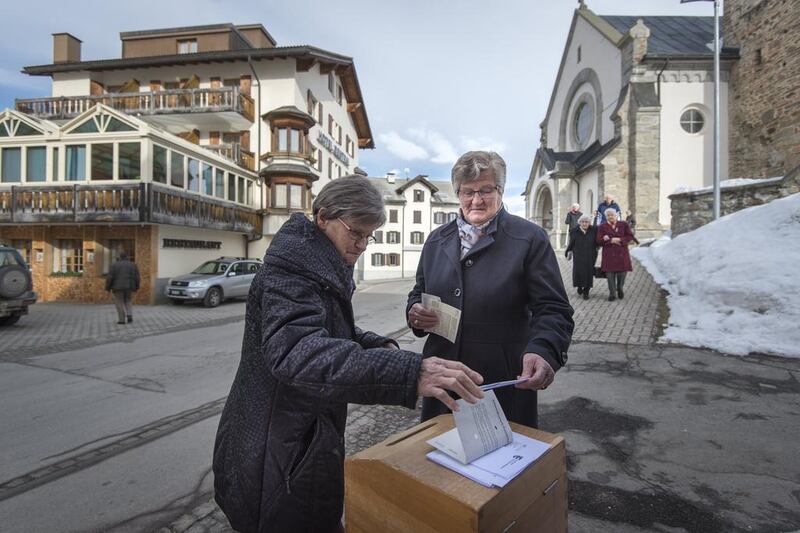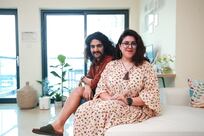GENEVA // Swiss voters on Sunday approved a measure to make it easier for third-generation immigrants to become citizens, crushing right wing nationalists who had stoked fears about granting nationality to more Muslims.
According to final official results, the “Yes” camp claimed 60 per cent support and a victory in 19 of Switzerland’s 26 cantons, meeting the two criteria needed for a win.
The government as well as most politicians of all parties supported the proposal, which will allow the grandchildren of immigrants to skip several steps in the lengthy process of securing a Swiss passport, although approval of their citizenship will still not be automatic.
The right wing Swiss Peoples Party (SVP), the largest party in the Swiss parliament, fought against the measure by putting Islam and national identity at the centre of the debate.
Reacting to the defeat, SVP lawmaker Jean-Luc Addor said his side was “alone against everyone in this campaign. The problem of Islam, I’m afraid, it will catch up with us in a few years.”
According to a migration department study, fewer than 25,000 people in the country of about eight million currently qualify as third-generation immigrants, a definition meaning they have at least one grandparent who was born in Switzerland or acquired residency.
Nearly 60 per cent of that group are Italians, followed by those with origins in the Balkans and Turkey.
During the campaign, Mr Addor warned that third-generation immigrants in Switzerland will increasingly be people “from Sub-Saharan Africa, the Horn of Africa, Syria or Afghanistan.”
The “No” camp faced heavy criticism over a widely-distributed poster showing a woman staring out from under a black niqab with a tagline urging voters to reject “uncontrolled citizenship”. However, the poster was commissioned not directly by the SVP but by the Committee Against Facilitated Citizenship, which has several SVP members and was co-chaired by Mr Addor. Sophie Guignard of the Institute of Political Science at the University of Bernsaud said that mainstream politicians and journalists viewed the niqab poster as “a violent attack against Muslims”. But Mr Addor defended it again on Sunday, saying its intent was to “affirm the identity of this country and the need to preserve it.”
Green Party politician Lisa Mazzone, said her side was “pleased it was able to prevail in a campaign where the opponents were completely hysterical”.
There are currently an estimated 350,000 Muslims in Switzerland.
Sunday’s referendum was part of Switzerland’s direct democracy system that includes four votes each year on subjects affecting federal as well as local laws and institutions.
In a 2004 ballot in which anti-Muslim messages played a prominent role during the campaign, Switzerland rejected automatic citizenship for third-generation immigrants who were born in the country.
The SVP in 2009 also successfully persuaded voters to approve a ban on new mosque minaret construction.
Before this year’s vote the government asserted that most of the people concerned had spent their entire lives in Switzerland and knew no other home, arguing that clearly entitled them to a facilitated citizenship process.
Polls leading up to the vote indicated a win for the “Yes” camp but some analysts said an upset remained possible, noting Swiss political history and recent trends elsewhere in the West.
Experts pointed to the apparent rising fortunes of right wing parties across Europe along with US President Donald Trump’s election win and his travel ban against seven mainly Muslim countries, which has now been rejected by two US federal courts.
* Agence France-Presse
Swiss voters on Sunday approved a measure to make it easier for third-generation immigrants to become citizens, crushing right wing nationalists who had stoked fears about granting nationality to more Muslims.
The “Yes” camp met the two criteria for a win by securing a majority of total votes and a majority of Switzerland’s 26 cantons, the public broadcaster RTS and national news agency ATS said.
Fifty-nine per cent voted “Yes”, according to provisional figures given by the polling institute gfs.bern, and at least 14 cantons were in favour, according to official results.
The government as well as most lawmakers and political parties supported the proposal.
Under it, the grandchildren of immigrants will be able to skip several steps in the lengthy process of securing a Swiss passport.
But the right wing Swiss Peoples Party (SVP), the largest party in Switzerland’s parliament, fought against it by putting issues of Islam and national identity at the centre of the debate.
Reacting to the defeat, SVP lawmaker Jean-Luc Addor said his side was “alone against everyone in this campaign”.
“The problem of Islam, I’m afraid, it will catch up with us in a few years,” he told RTS.
According to a migration department study, less than 25,000 people in the country of about eight million currently qualify as third-generation immigrants, a definition meaning they have at least one grandparent who was born here or acquired Swiss residency.
Nearly 60 per cent of that group are Italians, followed by those with origins in the Balkans and Turkish nationals.
Debate on the proposal had nothing to do with religion at the outset, said Sophie Guignard of the Institute of Political Science at the University of Bern.
It was the SVP, a party repeatedly accused of focusing on the risks of more Muslims becoming citizens and the possible “loss of Swiss values”, Ms Guignard said.
Sunday’s referendum is one of four each year for voting on subjects affecting federal as well as local laws and institutions.
* Agence France-Presse





